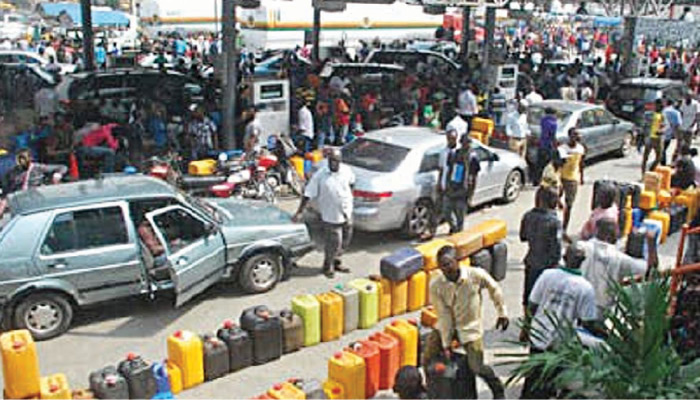
Keep up with the latest news and be part of our weekly giveaways and airtime sharing; follow our WhatsApp channel for more updates. Click to Follow us
Oil marketers have stated that filling stations should not be blamed for the recent hike in petrol prices, as queues for the commodity resurfaced in various locations on Saturday.
Many filling stations in Lagos, Ogun, Abuja, and Port Harcourt, among others, were closed on Saturday, as dealers explained that they were monitoring developments to make adequate price adjustments.
The hike in petrol prices follows the increase in the cost of the commodity by the Dangote Petroleum Refinery and various depot owners. Petrol prices have risen to between N1,050 and N1,150/litre, depending on the area of purchase.
The Petroleum Products Retail Outlets Owners Association of Nigeria (PETROAN) attributed the increase in PMS prices to the rise in the cost of crude oil in the international market. The benchmark for oil prices, Brent crude, stood at $80.85/barrel, while WTI oil and the OPEC basket were priced at $78.82 and $81.72/barrel, respectively.
The National President of PETROAN, Dr. Billy Gillis-Harry, stated that petrol prices are determined by market forces, as indicated in Section 205 of the Petroleum Industry Act. He emphasized that the government and the Nigerian National Petroleum Company Limited no longer set petrol prices.
Dealers confirmed that PMS prices would continue to rise since the major component in fuel production, crude oil, has been on the upward swing lately. The Dangote refinery raised its PMS price from N899/litre to N955/litre at its loading gantry, leading to a hike in pump prices by retail stations.
A major marketer, who spoke in confidence, stated, “There is no scarcity of product; rather, filling stations are closed because dealers are observing developments and are careful not to run at a loss.”
The dealer insisted that marketers should not be blamed for the hike in petrol prices, stressing that the situation was due to the rise in the cost of crude oil.
Gillis-Harry noted that increasing crude oil prices would inevitably affect domestic costs. “It’s no longer funny; even retail outlet owners are affected by this up-and-down movement of prices. It affects our business,” he said.
PETROAN advocated for the privatisation of government-owned refineries and encouraging competition in the downstream sector to mitigate the impact of PMS pricing in Nigeria. Gillis-Harry emphasized that PETROAN members cannot buy petrol at a higher price and sell it at a lower price. “Our selling rate always reflects our buying rate. Our members shouldn’t be blamed for the current increase; it’s an external factor,” he added.
The association also called on the government to provide a more conducive business environment for retail outlet owners, including access to affordable financing and infrastructure development.
Gillis-Harry commended President Bola Tinubu’s decision to fully deregulate the industry, unify foreign exchange rates, and implement policies “that unlock the full potential of our petroleum sector.”
PETROAN, in a position paper submitted to the press at the Petroleum Industry Stakeholders’ Forum, said the Nigeria oil and gas sector recorded significant milestones that shaped Nigeria’s oil and gas downstream sector in 2024.
“As a critical stakeholder, PETROAN, comprising membership with over 6,900 retail outlets across Nigeria, played a crucial role in ensuring the smooth distribution of value to Nigeria,” the association stated.
Therefore, PETROAN recommended the following: privatisation of Nigerian-owned refineries; establishment of a robust monitoring and evaluation framework to track the performance of downstream operators; investing in infrastructure development; addressing cross-border smuggling; and prioritising local refineries’ access to crude oil.
The association reiterated its commitment to supporting initiatives that promote the growth and sustainability of Nigeria’s petroleum sector. PETROAN pledged to add value to the stakeholders’ forum, contributing to shaping the industry’s future and addressing its challenges.
In a related development, the few filling stations that dispensed petrol on Saturday sold it above N1,000/litre in Lagos, while those that dispensed below N1,000/litre, such as MRS, had long queues.
The MRS filling stations in the Alakpere and Ojodu Berger areas of Lagos that dispensed petrol at the N935/litre price earlier agreed between the oil marketing firm and the Dangote refinery had massive queues of motorists on Saturday.
As the situation continues to unfold, motorists and commuters are advised to be patient and prepare for possible further price adjustments. The government and stakeholders are urged to work together to find a lasting solution to the challenges facing the petroleum sector.
Please don’t forget to “Allow the notification” so you will be the first to get our gist when we publish it.
Drop your comment in the section below, and don’t forget to share the post.







